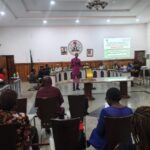Still On Teachers Welfare: A Call On Delta Government, NUT To Empathise
By Osita Biose
It is no longer news that teachers, particularly those in the primary schools in Delta State, are groaning under subtle neglect. What appears confusing is the near noncommittal attitude of the representatives of the state government and other relevant stakeholders in the education system to take the needed bold step in addressing some of the salient issues confronting the welfare of primary school teachers in the state, especially stagnation.
Yes, the continued stagnation of holders of the Nigeria Certificate in Education (NCE) among primary school teachers in the state, whose entry point was grade level 07 step 2 and ceiling at grade level 14, in line with the National Policy on Education (NPE) is becoming unacceptable, requiring urgent and immediate redress by the state government and all other concerned stakeholders. The redress will not only boost the morale and commitment of the affected teachers in the primary schools but would strengthen the very foundation of the education system in Delta state.
One wonders why the state government would find funds to pay exorbitant salaries and allowances to staff/political appointees in the local government councils and yet deny primary school teachers their rightful upgrade in the same locale. The release of funds to local government to bridge salary gaps, as intervention by the then Uduaghan and Okowa administrations that preceded present Oborevwori Administration with current increased federal allocation (FAAC) is a clear indication that the state government has the financial muscle to address the plight of primary school teachers, if it so desires.
According to Governor Oborevwori, he has not borrowed a dime to fund any of the projects under his watch and still paying back loans incurred by his predecessor unhindered. In the words of Aniagwu, at a press briefing, “Delta is Solvent” and projects are spread evenly across the three senatorial districts of the state by the governor.
Furthermore, the decision of the state government to rehabilitate and reconstruct the Warri-Sapele-Benin Federal Road and other roads across the state starkly contrasts with the neglect of primary school teachers, raising questions about the priorities of the state government. For sure infrastructure development is important, but should not be prioritised above human capital development. That the government may be prioritising asphalt over aptitude and roads over education is another cause for worry.
Some may argue that primary school management falls under the administrative purview of local government. However, given the interventionist concern of the state government so far, under the eagle watch of the governor, Rt. Hon. Sheriff Oborevwori, as demonstrated on several instances in shouldering some of the overloads of t-e local government councils, it would not be out of place to critically harp on the need for the state government to address teachers’ plight at the primary school level.
Working in harmony with the leadership of the Nigeria Union of Teachers (NUT) ,Ministry of Primary Education,State Universal Basic Education (SUBEB),Delta State House of Assembly and other relevant authorities to address what appears inconsequential, but damaging the very foundation upon which education revolves in the state is necessary now.
Through proper legislation and upgrading, stagnated teachers in the primary schools could be lifted to enable them progress on their career ladder like their counterparts with degrees in the secondary schools.
Again, it is appalling that up till date, primary school teachers do not receive monthly salary payment slips to keep records of their earnings. This too can be addressed through proper arrangement. If teachers in the secondary schools in the state could get such documentation, those in the primary schools should.
Although, the state government on every given opportunity has continued to shower encomiums on the roles of teachers as partners in progress in taking the state to greater heights in the education sector, there is the urgent need to match action with the heartwarming promises from the state government to ensure that the rewards of teachers are achievable here on earth, not in heaven.
The world is evolving technologically. Primary school teachers who are laying the foundation of the education needs of future leaders in the state should not lag behind.
Monday Onyeme, speaking during the World Teacher,’s Day in Asaba as the representative of Governor Sheriff Oborevwori said that the issue of graduate teachers in primary schools would be addressed, stressing that all university degrees are the same and should be treated as such. In line with this conviction the leadership of the NUT in the state, should dialogue with the state government , to consolidate on the realities on ground and necessary actions taken to palliate the present unwholesome situation of primary school teachers in the state.
A successful dialogue involving the NUT, the state government and other relevant stakeholders could pave the way for a resolution, forestalling any potential industrial action in the state.
It is against the foregoing that the government and other relevant stakeholders in the education system in the state should prioritise the following without further delay:
- upgrading of primary school teachers from NCE bar on salary grade level 14 to University degree bar on Salary Grade level 17 for those who upgraded like their counterparts in the secondary school.
- provision of payslips to primary school teachers to enhance transparency and fairness in remuneration and
- addressing ICT challenges through the provision of regular trainings and resources to equip teachers in conformity with trending global technological advancements.
The future of the state, and indeed the country, depends largely on the quality of school teachers. No amount of resources deployed for the continued upgrade of teachers should be regretted, if properly channelled.




